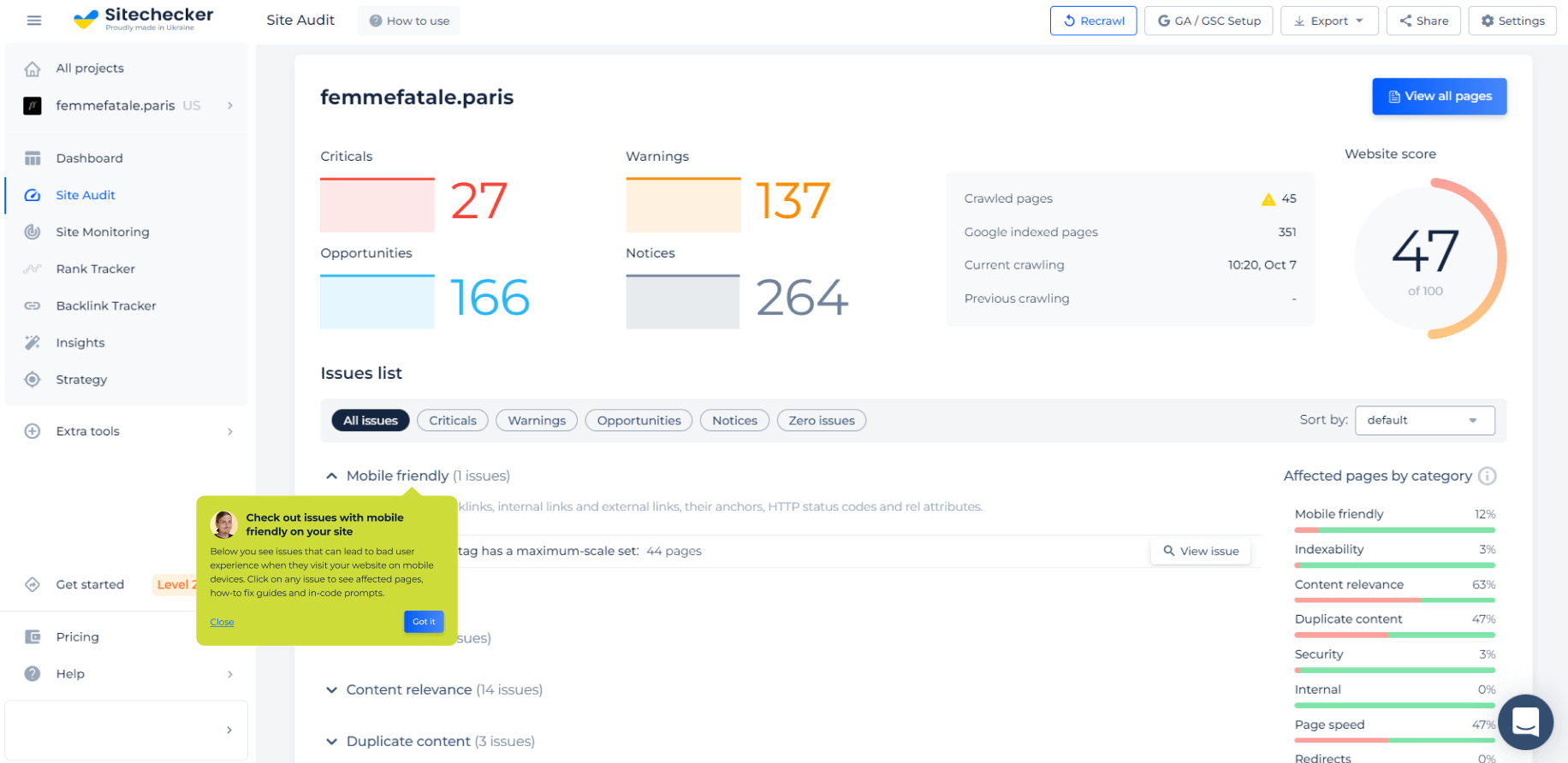Looking to ensure your website performs perfectly on mobile devices? Here’s a quick list of the top 10 free mobile-friendly test tools for 2024. Check out these tools to make sure your site is mobile-ready!
- Mobile Friendliness Test Tool by Bing
- Mobile Friendly Test Tools by Smallseotools
- Bulk Mobile-Friendly Test by TechnicalSEO
- Bulk Mobile Friendly Test by EXPERTE
- Mobile-Friendly Test by Sitechecker
- Free Mobile Friendly Test by SEOMator
- Mobile Friendly Test by Duplichecker
- Mobile Friendly Test by SE Ranking
- Mobile Friendly Test by Genelify
- PageSpeed Insights
Keep reading for an in-depth look at each tool, their unique features, and how they can help you improve your site’s mobile usability.
What is a Mobile Friendly Test?
A mobile-friendly test evaluates how well a website performs on mobile devices. It checks if the site is accessible and usable on smartphones and tablets, focusing on aspects like responsive design, load times, and user experience.
Key Aspects Evaluated:
- Responsive Design: Ensures that your site adapts to different screen sizes.
- Page Load Speed: Measures how quickly your site loads on mobile devices.
- User Experience: Assesses navigability, readability, and usability on mobile screens.
10 Best Mobile Friendliness Tests
1. Mobile Friendliness Test Tool by Bing

Description: Bing’s Mobile Friendliness Test provides a detailed analysis of your site’s mobile usability. It highlights issues and offers insights for improvement.
Pros:
- Direct integration with Bing Webmaster Tools.
- Clear, actionable recommendations.
Cons:
- Limited to Bing’s search engine ecosystem.
2. Mobile Friendly Test Tools by Smallseotools

Description: Smallseotools offers a straightforward mobile-friendly test that evaluates your site’s mobile compatibility.
Pros:
- User-friendly interface.
- Free and easy to access.
Cons:
- May not provide in-depth analysis compared to other tools.
3. Bulk Mobile-Friendly Test by TechnicalSEO

Description: This tool allows you to test multiple URLs at once, which is great for managing large sites.
Pros:
- Bulk testing capability.
- Comprehensive results for each URL.
Cons:
- Limited features in the free version.
4. Bulk Mobile Friendly Test by EXPERTE

Description: EXPERTE’s bulk test tool is designed for users who need to assess mobile friendliness across many pages efficiently.
Pros:
- Handles multiple URLs efficiently.
- Detailed insights for each page.
Cons:
- Can be slow with very large batches.
5. Mobile-Friendly Test by Sitechecker

Description: Sitechecker offers a comprehensive mobile-friendly test that focuses on usability and performance metrics.
Pros:
- Provides detailed usability scores.
- User-friendly interface.
Cons:
- Some features are limited in the free version.
6. Free Mobile Friendly Test by SEOMator

Description: SEOMator provides a free mobile-friendly test with a focus on SEO and usability aspects.
Pros:
- Integrates mobile-friendliness with SEO insights.
- Provides a clear report with improvement suggestions.
Cons:
- Free version has some limitations.
7. Mobile Friendly Test by Duplichecker

Description: Duplichecker offers a simple tool to test mobile-friendliness with quick results.
Pros:
- Easy to use.
- Quick results.
Cons:
- Basic features with less in-depth analysis.
8. Mobile Friendly Test by SE Ranking

Description: SE Ranking’s tool evaluates your site’s mobile performance with a focus on SEO metrics.
Pros:
- Comprehensive SEO and usability insights.
- Easy to interpret results.
Cons:
- Free version may have limitations.
9. Mobile Friendly Test by Genelify

Description: Genelify provides a straightforward mobile-friendly test that offers essential insights for mobile optimization.
Pros:
- Simple and intuitive interface.
- Good for basic checks.
Cons:
- Less detailed compared to other tools.
10. PageSpeed Insights

Description: Google’s PageSpeed Insights measures both mobile and desktop performance, focusing on speed and user experience.
Pros:
- Provides performance data and actionable insights.
- Widely recognized and used.
Cons:
- Focuses heavily on speed, with less emphasis on design.
Does Mobile Friendliness Affect SEO?
Yes, mobile-friendliness significantly impacts SEO. Google uses mobile-first indexing, meaning it primarily uses the mobile version of your site for ranking and indexing. A mobile-friendly site can improve your search engine rankings and user experience.
Key Impacts:
- Search Rankings: Mobile-friendly sites rank higher in search results.
- User Experience: Better mobile usability leads to lower bounce rates and higher engagement.
Learn More: Top 10 Best SEO Software for Small Businesses
Pros and Cons Of Mobile Friendliness
Pros:
- Improved User Experience: Easier navigation and readability on mobile devices.
- Higher Search Rankings: Mobile-friendly sites perform better in search engines.
- Increased Traffic: Better mobile usability can lead to higher visitor retention.
Cons:
- Development Costs: Ensuring mobile compatibility may require additional resources.
- Complexity: Maintaining a responsive design can be more complex.
Conclusion
Ensuring your website is mobile-friendly is crucial for both user experience and SEO.
Use these top 10 tools to test and improve your site’s mobile compatibility, and you’ll be well on your way to better performance and higher search rankings. Thanks for reading!



